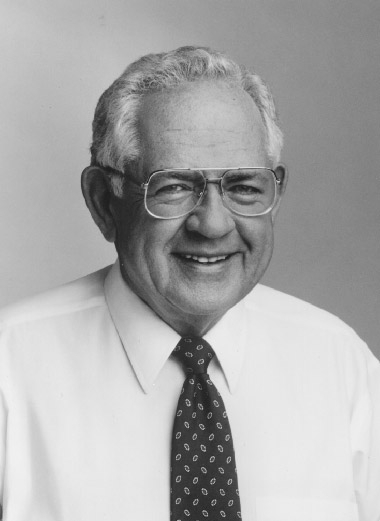R. David Thomas*
Class of 1979
- Founder and Chairman Wendy's International, Inc.

Don't take your freedoms and opportunities for granted.
“My story,” Dave Thomas has said, “proves that the free-enterprise system works, and that because of it the everyday American can make a success of himself and influence those around him for the better.”
Dave’s story began in Atlantic City, New Jersey, in 1932. An orphan, Dave was adopted while still an infant by Olivia and Rex Thomas of Kalamazoo, Michigan. Olivia died when Dave was a young child. When he was six, he left Kalamazoo to take to the road with his adopted family. Rex was a pipe-fitter who traveled constantly from job to job. “We moved so much that I didn’t get to know many kids,” Dave recalls, but he had another constant companion: work. Rex expected him to work, and when Dave lost his first two jobs because he was under age, his father was furious. “He said to me, ‘You’ll never keep a job!'" David remembered. “I can tell you, that has stayed with me.”
When the traveling Thomases touched base in Knoxville, Tennessee, Dave became, at 12, the “youngest counterman in the state.” His job at the Regas Restaurant was the beginning of his extraordinary restaurant career. Dave’s travels ended for a while the next year when he moved to Fort Wayne, Indiana. There, he was hired as a busboy in the Hobby House Restaurant.
Three years of Army service followed, during which Dave worked as a baker and then became one of the youngest individuals ever to manage an enlisted men’s club. At the age of 21, with military service behind him, Dave returned to the Hobby House as a short-order cook, married Lorraine Buskirk (a fellow Hobby House employee), and quickly worked his way up the ladder to become the restaurant’s assistant manager.
In 1956, Hobby House bought its first franchise from Colonel Harland Sanders, and so began Dave’s working relationship with the Colonel, which was to play an important part in his career path.
At the age of 30, Dave was the father of four children and vice president of Hobby House Restaurants in Fort Wayne. He had security in his job, but he was not progressing in his career as rapidly as he desired. At about this time, Phil Clauss, the president of Hobby House, asked Dave for help. It was a big risk, he warned, but if Dave wanted to try his hand at reviving several failing Kentucky Fried Chicken outlets in Columbus, the challenge was his. Colonel Sanders himself was extremely skeptical, and doubted anyone could make a success of those restaurants. This was the opportunity Dave had been looking for. Although it meant leaving behind the security of his job in Fort Wayne, and moving his large family to Columbus on the strength of “nothing but promises,” Dave felt he had to do it.
In Columbus, he made some drastic changes right away, cutting out virtually everything on the menu except fried chicken. He also introduced the unusual use of buckets and barrels to contain the chicken. The stores were too short on cash to advertise, but that didn’t stop Dave. He traded barrels of fried chicken for promotions of “KFC” on local radio and television stations. Soon, Dave had expanded the operation of four faltering stores to eight successful ones.
During this period, Dave and the Colonel’s friendship grew. Dave was present when the Colonel received the Horatio Alger Award in 1965. “This made a deep impression on me, and provided more motivation to be successful as an entrepreneur.”
In 1968, Dave sold his own KFC franchise to the parent company, remaining as regional director of operations. At 35, he was a millionaire, but, more importantly in his view, he had received “a lifetime of experience” from the Kentucky Colonel.
After a short time with Arthur Treacher’s Fish & Chips chain (Dave was one of the original investors), he began to feel that he was ready to tackle another quest. With his firm belief in free enterprise, backed by an extensive knowledge of the restaurant industry, he decided to ignore the skeptics who declared the quick-service market was already saturated, and set out on his own.
On November 15, 1969, Dave opened the first Wendy’s Old Fashioned Hamburgers restaurant in downtown Columbus. His goal was to provide a “Cadillac” hamburger that would be custom-made. Using a principle similar to the one that had worked so successfully in the KFC stores, Wendy’s served a limited menu, using fresh, high-quality food.
Between 1969 and 1972, Dave opened four Wendy’s restaurants in the Columbus area. In 1972, he decided to franchise the restaurants. Other innovations have appeared over the years, and at the end of its first 12 years, there were more than 2,200 Wendy’s restaurants across the United States, with an additional nine in foreign countries. Sales were more than $1.4 billion a year.
Dave Thomas’s philosophy was to “always put more back into life than you take out.” He financed the enlargement and consolidation of the clinical laboratories of Children’s Hospital in Columbus, where the labs were dedicated in honor of Mr. and Mrs. Thomas. Dave also donated a kitchen to the Ohio Dominican College in Columbus. In 1981, he served as honorary chairman of the Central Ohio Christmas Seal campaign.
A director and generous supporter of St. Jude Children’s Research Hospital in Memphis, he received that hospital’s highest award. In 1982, he received the Ohio Governor’s Award, and he became the recipient of many other honors from charitable and service organizations, including the Sertoma International Citizen of the Year Award. In 1981, the University of Florida selected Dave Thomas as Honorary Alumnus of the Year.
Dave and Lorraine Thomas had five children: Pam, Kenny, Molly, and Wendy—the namesake of the Wendy’s restaurant chain—and Lori.
